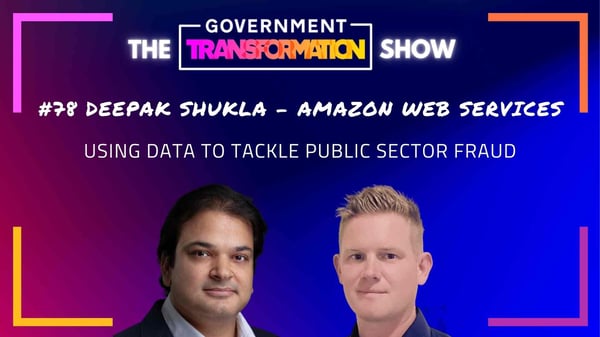Building on data interoperability lessons from the pandemic
The complexity and legacy of public sector organisations' databases present a huge barrier for interoperability and data integration within government departments. Different standards, access points, architectures and security levels stand in the way of ensuring an efficient delivery of citizen services.
Two data executives from the Department of Work and Pensions (DWP) and Medicines and Healthcare Products Regulatory Agency (MHRA) joined us at the Government Data Show to share lessons on data interoperability learned during the pandemic - and how they are building on the progress made.
Art of the possible: doing more with data
For Diana McAuley, Head of Data and Information Governance at MHRA, a clear lesson from the pandemic has been that organisations can do much more with data and can do it faster.
“In terms of interoperability, we've demonstrated that, where there's a will, it can be done,” McAuley said. This was exemplified by her agency’s integration of hospital data with that from GP surgeries on adverse reactions to inform the safety of the Covid-19 vaccines. Although similar efforts to bring together this type of data had been tried for a number of years, her team was able to achieve it in a matter of days, pushed by the urgency of the national crisis.
“I think that really showed what was possible,” continued McAuley. “And I think that what we can learn from that is that you need that impetus, you need that wheel behind it. You need high level principles to be in place and to be agreed, and then you need the people from the operational tech teams on the ground to be given the authority to go and make it happen. That was key in making this work.”
Understanding that interoperability can happen at a faster pace across government was also an important pandemic lesson for Jacqui Leggetter, Deputy Director of Integration Product Delivery at DWP: “Data became the forefront of everything. We've really moved at such a pace to make data driven decisions, not just in DWP, but across government.”
Seeing the daily Covid-19 Downing Street reports and how data informed the decisions taken during national lockdowns has helped departments reconsider the importance that maximising the use of data can have for policy-making. However, it also exposed the dysfunctionality that stops this data being used effectively for the benefit of the people.
Leggetter said: “[The pandemic] brought to light the number of services that we provide to citizens across government and how connected those services are for the citizen - but how disconnected they are for us at government because we operate in silos.”
Building on the progress made
For government departments to share data effectively, there is a need for quality data standards and metadata models, as well as keeping common formats on how they hold common data items.
Leggetter said that there has been progress in this area as central government makes major strides on common data patterns, data sharing agreements and compliance.
Using an API event-driven architecture, DWP has opened its data sharing ecosystem to allow other organisations, such as the NHS, to verify in real time if someone is in receipt of benefits. This has proven particularly helpful for pharmacies to carry out free prescription checks to avoid error or fraud.
The NHS in England loses an estimated £256m a year in prescription fraud. The API model has been reused with the Department for Education for free meal checks and with DVLA for blue badge checks.
“It's given us a much more holistic view of the citizen. It's enabling us across government to use the information that we already know about that citizen in a productive way, while still keeping it secure and protected, saving us asking the citizen for things that they may have already sent to us.”
DWP is now working with the Government Digital Service (GDS) on how they can apply and build on the lessons learned from the pandemic on cross-data government interoperability now that there are clear metadata and data standards in place, and there is a consent-based model for sharing data across government.
Towards more data integration
McAuley agreed that a key step for her organisation will be to hold on to the gains of the pandemic and build on them. An example is further integration of the Yellow Card app (a scheme for reporting adverse reaction to medicines) with the NHS app, which already started during the Covid-19 vaccine rollout for people to report any jab side effects.
“We've never done monitoring of adverse reactions on the scale that we have had to do during the pandemic, and it's been very important in building public confidence as well around the safety of vaccines,” McAuley told delegates of the Government Data Show.
The Medicines and Healthcare Products Regulatory Agency will spend the next couple of years doing a technology refresh to overcome some of the data-sharing challenges presented by legacy infrastructure. It will also be revisiting the basics to ensure that the right foundations are in place, as well as ensuring that the right data standards are underpinning them.
To avoid slipping back into old working habits (something that McAuley said is “always a danger”), government organisations need to find a way to replicate the pace that was achieved during the pandemic without the drivers that motivated them.
“For me, that is about learning from getting a framework of high level principles in place and then start putting that framework in place of data standards, data-sharing agreements, that people can easily pick up and use, getting that support in place, so that we can move quickly.
“Then we also [need] a really good understanding of the risk appetite of the organisation and to look at that in the context of the benefits of data sharing.”
Finally, McAuley added that it will be essential to enable the people who are doing the actual data sharing to work through the details rather than leaving the decision making to those at the top: “I would like to see us building on those lessons that we have learnt from the pandemic.”
You can watch the full replay of 'Maximising data interoperability and integration to support Public Sector innovation' here.






